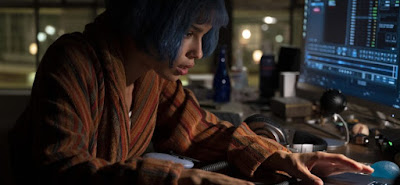Of course now is the perfect time for a paranoid thriller. Leave it to director Steven Soderbergh to find a sharp way to shoot one in an anxious modern telling, and consummate blockbuster writer David Koepp to construct one so involvingly tightly-wound and lockbox sealed that it proceeds so quickly and craftily by its own clever logic and is practically over before it even begins. Kimi is the model of gripping efficiency, setting up a contained space and a clear set of variables that then twist the knife and speed the inevitable. And it's so of-the-moment it feels like it was shot next week. Set in a very now Seattle, with COVID on the wane and some small sense of normality slipping back into life, it finds its lead not quite ready to leave the comfort of her apartment. She (Zoe Kravitz) was dealing with trauma-induced agoraphobia before the pandemic, and the anxieties of disease and social distancing understandably didn’t help matters. Besides, she has a work-from-home job resolving mismatched commands recorded by an upstart smart speaker company. What could go wrong?
With these 30-second eavesdrops on people’s lives, she hears the usual mumbled commands and silly A.I. misunderstandings. (The machine seems a lot better than an Alexa or a Google bot, but here’s a movie that’ll do nothing to dissuade those of us who’d rather not invite a surveillance machine into our homes.) The plot takes a modern Rear Window turn (in a way much more smartly updated than the otherwise fine Disturbia from, oh, 15 years ago now?) when she thinks she overhears a crime. Shades of Blow-Up and Blow Out and The Conversation follow as she pushes and prods at the file to make it make sense, and figure out her next move. More than a touring riff on the great classics of paranoia-driven suspense pictures of this ilk, Kimi is an of-the-moment character piece told in fine detail and expert shorthand, wedded to the unrelenting momentum of its story.
Here’s a woman shaken up by the experiences of the past couple years, which have only exacerbated issues stemming from an assault prior to that. Kravitz plays the comfortable discomfort of her routine well, and then sells the physically taxing idea of stepping out with a skin-crawling sense of being trapped in her own skin. Why, even a FaceTime from a therapist sends her itching. An early scene sees her carrying on a flirtatious text chain with a neighbor from across the street, but she can’t make herself even open her door to meet him outdoors at a food truck. So of course she gets lost in something she thinks she can better control: the mystery in that audio file. We see her apartment decorated with the tools of the trade, but also masks and hand sanitizer and wipes. She’s a product of our times. I could relate to her reluctance to step out. So she digs deeper into her new technologically aided project? It does sound like a crime, after all. The better audio window she gets into the anonymous user, the more rattled she becomes. Soderbergh expertly situates steady, locked-down shots of her daily routine, the better to feel the sense of danger creeping into them, and to upend them with hurtling handheld anxiety on the outside.
When she inevitably, reluctantly has to leave her apartment to further her investigation, the camera zooms towards her like something out of Evil Dead, whips around her at canted angles, and races past only to spin around and catch her again. Other people in public can be discomfiting enough nowadays, even without the layer of unease she’s added on top of the usual. She’s trapped further by the thriller mechanics, and a cast of looming potential threats—a Romanian tech guy, a spying neighbor, an upstairs construction site, a sniveling tech company stooge, its smarmy CEO and his shady fixers. It’s all laid out skillful and credibly; it’s the kind of edge-of-your-seat suspense that is both totally enveloping in the moment, and completely sensible in retrospect. Because the filmmakers have hooked so powerfully into the mindset of their lead, and dove-tailed it so seemingly effortlessly with Soderbergh’s pet themes—here’s another of his dramatic expressions of contemporary ills in vivid genre tropes and character detail, like Unsane or Magic Mike—there’s a terrific sense of hurtling escalation. When we get to the climax, these elements are drawn together wonderfully in a cathartic final sequence that more than pays off everything that’s been set up.
This is an especially satisfying thriller all the way, with the nerve to say that our problems aren’t just the pandemic, per se, but the whole jangling anxiety of our overstimulated tech-captured and corporate-enraptured now. More than once, people or things are not what they seem, and not just because of the movie’s needs. We casually are shown staged Zoom backdrops and faked Instagram feeds in the course of this story’s telling, and not even as plot points. That’s just how it is these days, where the ground of our shared reality can feel like it’s shifting beneath our feet as we get lost in the layers of real unreality on our screens. (At one point, Kravitz dryly quips she can handle herself—“I used to be a content moderator for Facebook.”) No wonder we’re paranoid. Kravitz, who holds the screen as compellingly as ever, carries off this sense of constant tension, even in the quotidian, so intently and intensely that we don’t just want her to solve the case and dodge the complicating dangers. We want her to feel like she’s back, and safe, on solid ground. And don't we all?


No comments:
Post a Comment